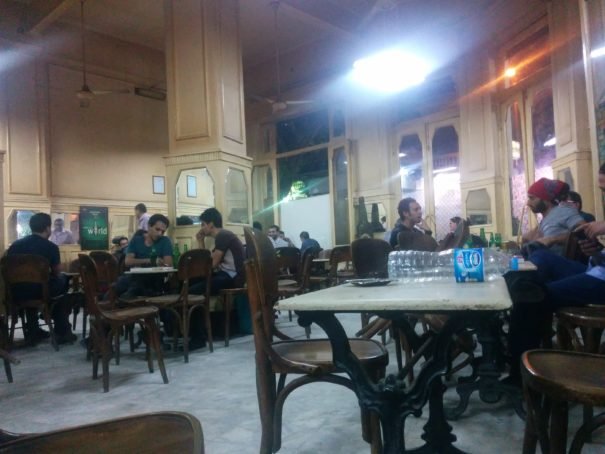
The Dancing Faded, but the Drinking Endured

The Dancing Faded, but the Drinking Endured
Beer in Cairo
It is a little past six in the evening when the call to Maghrib prayers goes out. A walk through Downtown Cairo is a walk through the city’s history: mosques and churches; run-down but iconic coffee houses; imperial-era buildings that haven’t been painted in years; graffiti cursing Mohamed Morsi, the ousted ex-president of Egypt. As we turn a corner, another run-down establishment catches my eye: a bar. Like all things in downtown Cairo, it has its charm. My friend hesitates, but I drag him inside.
El Horreya is a baladi bar. At one time, baladi bars and their live cabaret performances were the highlight of Cairo’s nightlife. Over time, the dancing faded, but the drinking endured. These days, El Horreya has no pretensions: it’s dedicated only to the twin vices of drinking and smoking.
The insides of the café are painted a pale yellow. Timeworn, rusted mirrors are mounted on its square pillars and long-winged fans hang from the high ceiling. Old, hand-written drink adverts decorate the walls. An Arabic menu on the wall lists Shai (tea), Kahwe turki (Turkish coffee) and Bebsi cola (Pepsi) among other non-alcoholic beverages.
We look around for a beer menu. It’s just a printout pasted on a pillar listing the beer options: Stella, Heineken, Meister, and ID. The round-faced, slightly round-bellied waiter has already made up his mind to serve us Stella and puts two bottles on our table. This is not Stella Artois. It’s Egyptian Stella: a mild lager, with just the perfect amount of bitterness for gulping down three or four (or more) on a warm Cairo day. No wonder the table next to ours is littered with 15 empty bottles.
Brewing beer is an ancient art in Egypt. Just a few hundred meters away, in Tahrir Square, the Museum of Egyptian Antiquities displays artifacts that attest to the importance of beer-making in Pharaonic times.
I take a look around, and the waiter sets two more bottles on our table. On our left, young men with long, beaded hair share tables with short-haired women. El Horreya has a reputation for playing a central role in Egypt’s high-adrenalin political life. Frequented by artists, thinkers, and liberals, it’s pretty much the place in Cairo for discussing politics. I finish my second beer and some of my inhibitions fade. On our right, three middle-aged people are engaged in deep conversation, an Arabic newspaper on their table. They stare unpleasantly at me as I take pictures of the bar. I wonder who is feeling threatened, them or me? I’m a little tense. We settle the bill. Before we leave, I take a last glance inside and see that the waiter, in a time-honored method of defusing tension, has grabbed a bottle himself.